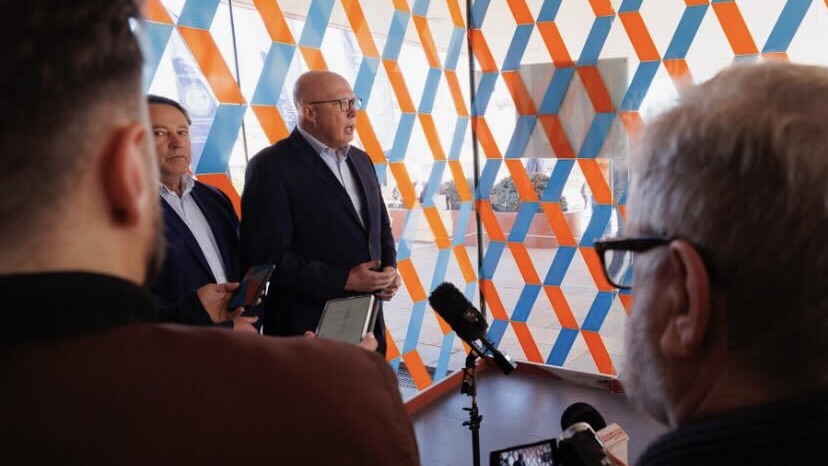Diggers and Dealers: Peter Dutton is in town, so there’s that … Stockhead’s first dispatch from Kalgoorlie

Election hamster wheel spins: Peter Dutton speaks at Diggers and Dealers. Pic: Josh Chiat
- Peter Dutton flies into Kalgoorlie as 2025 election hamster wheel spins
- New Diggers minority owner Stuart Tonkin votes up Kalgoorlie
- Kim Beazley talks hungry panthers, defence and rare earths in keynote speech
Peter Dutton has made a flying visit into Kalgoorlie to stamp his claim as a MAN OF INDUSTRY. He wants less red tape, more uranium and some nuclear power.
The hamster wheel of the 2025 election has begun spinning.
His trip comes in before a presentation from the extraordinarily charismatic Amanda Lacaze, head of rare earths miner Lynas (ASX:LYC).
If she can keep the magnet metals producer on track and finally complete their long-delayed Kalgoorlie plant … and break China’s hold on the heavy rare earths market, maybe she can pitch for a run at Kirribilli House instead.
Let the games begin: Kalgoorlie is, as the locals like to say “the centre of the Universe.”
Digging deep
An interesting announcement from Diggers and Dealers ahead of the event with big wigs of the sector Stuart Tonkin (Northern Star Resources (ASX:NST) MD), Mark Clark (Capricorn Metals (ASX:CMM)) and Darren Martin (Longreach Capital). They join the husband and wife team of Myles Ertzen and Sharon Giorgetta, son-in-law and daughter of mining rich-lister and former Diggers chairman Nick Giorgetta.
Speaking to media on Sunday at the Super Pit ahead of the event, Stuart Tonkin was careful to divorce his leadership of the Super Pit owner and leading $16bn ASX gold miner from his personal investment in the conference held every year in the town.
Each year there are calls – for reasons of accommodation, cost and the town’s association with drink and skimpy waitresses – to move it to the capital. As a former Kalgoorlie local, we hope there’s a middle ground here. There remains something special about a mining gathering on the doorstep of what could again be the richest gold mine in Australia by 2029.
Tonkin, a former WA School of Mines graduate, gave his vote of support to maintaining its unique status in the Goldfields town.
“It’s not associated with Northern Star. I think it’s a testament that I’ve watched the forum over three decades, when I first arrived in Kalgoorlie and seen its success and its growth,” Tonkin said in responses to Stockhead.
“And I think, if anything, the new investors show the confidence that it’s here to stay, and the commitment from the local council to … budget for a permanent infrastructure there means that … they’ve got a long outlook.
“And I think it’s great for the Goldfields, and it’s great for the community, and I think we should enhance it. Of course it’s being modernised as it does, but I think it’s really … key to a great event annually, and it will continue to be.”
Beaz-wax
Kim Beazley, former Federal Opposition Leader, US ambassador and WA Governor gave the keynote talk, delivering an impassioned lobby for the AUKUS nuke submarine deal and urging the Government to step up and break the Chinese hold on the rare earths market.
This caught our ears, on the distinction between conventional and nuclear subs:
“If the kids have left all their toys in the backyard … you’ll take a punt on the funnel web spiders not being where they are.
“Having a nuclear submarine is like having a hungry panther in your backyard, you don’t go out, and that’s all there is to it.”
How did this man never win an election?
Beazley thinks threats are not yet coming, but as Global Warming progresses and a battle for scarce resources gets more extreme, he’s advocating the building of military bases along WA’s vast coastline. He may have read a passage from Tomorrow, When the War Began.
The crux for miners was this: Beazley really wants support for the rare earths from Government to skittle the Chinese dominance of the commodities critical to the scale up of electric vehicles and renewables.
He thinks as much as $4-5 billion could be spent subsidising an Aussie rare earths industry, noting in particular Lynas’ (ASX:LYC) Mt Weld mine and Kalgoorlie processing plant, Iluka Resources’ (ASX:ILU) Canberra backed Eneabba refinery and the Browns Range mine held by Northern Minerals (ASX:NTU), a potential source of the heavy rare earths terbium and dysprosium largely produced by Chinese producers and Chinese-backed miners in Myanmar.
Drawing on a lifetime of thinking about Australia’s defence, Beazley referred to the diggers in attendance as the ‘mining brigade’, if anyone needed to inflate the egos of our mining executives further.
On the market, miners tanked after weak Chinese and US manufacturing data pulverised base and battery metals, while uranium explorers continued to tank on news of production expansions in Kazakhstan.
Related Topics

UNLOCK INSIGHTS
Discover the untold stories of emerging ASX stocks.
Daily news and expert analysis, it's free to subscribe.
By proceeding, you confirm you understand that we handle personal information in accordance with our Privacy Policy.








